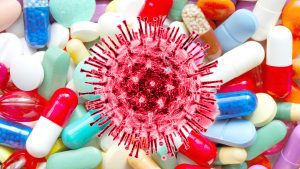
More than half of Ukrainians do not trust the data of the Ministry of Health on the situation with the incidence of coronavirus (COVID-19) in Ukraine, considering these data to be either overstated or understated. This is according to the data of a common sociological study conducted by Active Group and Club of Experts companies, the results of which are available to Interfax-Ukraine.
According to the study conducted on July 10-12 by telephone interview, in particular, 34.2% of respondents do not trust the official data, since, in their opinion, the statistics of the Ministry of Health on the number of COVID-19 cases is overstated.
Another 20.5% of respondents do not trust the official statistics, considering it understated.
Some 18.6% of respondents fully trust the official data and some 14.9% partially.
According to the study conducted in early July, some 34.8% of respondents said that lockdown restrictions did not change their work in any way, while according to the study conducted in April, only 18.3% of respondents said that lockdown did not affect to their work.
The study was conducted throughout Ukraine, with the exception of the temporarily occupied territories and the Autonomous Republic of Crimea, based on a representative sample. The study involved 1,000 respondents.

President Volodymyr Zelensky signed the law on amendments to certain Ukraine’s legislative acts on government support of culture, creative industries, tourism, small and medium businesses due to the restrictive measures related to the spread of coronavirus (COVID-19) disease.
“Creative industries, cultural institutions are among those which suffered most from lockdown. After all, their activities have stopped almost completely and now they live in total uncertainty. These are entire sectors of the economy that are now on the brink of survival. They also pay taxes and provide people with jobs, therefore, need no less support than traditional business sectors,” the head of the state said during signing the document.
The Verkhovna Rada of Ukraine adopted law No. 692-IX at second reading on June 16. It was supported by 343 MPs. The document establishes a reduction in property rental fees at the request of the tenant of a cultural institution engaged in entrepreneurial activity using this property, for the entire time that it could not be used.
The document also provides additional opportunities for radio by simplifying procedures by amending the law of Ukraine on advertising.
It is important that the document also stipulates the government support for cinematography in the form of providing a government grant for the development of film projects. It is noted that for national fiction, animated, documentary films, films for children (including artistic and cultural significance), films of artistic and cultural significance (copyright), television films, series and debut films, it can be up to 100% of total estimated cost inclusive.
Amendments are also being made to the law of Ukraine on the rental of state-owned and communal property in order to normalize the provision of paid services in the field of culture and arts by cultural institutions.

India has donated 50,000 capsules of the OMVIR antiviral drug, which is used to treat patients with COVID-19, as humanitarian aid to Ukraine, the Ministry of Health reports.
According to the report, these medications will be enough to treat about 5,000 patients.
“Ukraine is very grateful for the humanitarian aid of 50,000 capsules of the OMVIR preparation. This drug is included in the domestic treatment protocol and our hospitals, identified as supporting in the fight against COVID-19, are very interested in receiving it. This lot is enough to treat about 5,000 patients,” Ihor Ivaschenko, the Deputy Minister of Health for European Integration, said.
Ambassador of India to Ukraine Partha Satpathy noted that, if necessary, there may be additional deliveries of this drug.

The Health Ministry of Ukraine has allowed clinical testing of four domestic medicines with the aim of studying their effectiveness for patients diagnosed with coronavirus (COVID-19).
These medicines include Amizon Max, Amixin IC, Bioven and Corvitin, Health Minister of Ukraine Maksym Stepanov said during a press briefing on Monday.
“Some clinical trials are at the final stage. As soon as results are obtained, conclusions on a possibility of using these medicines for treatment of the coronavirus disease will be made,” the ministry said.
The Health Ministry also monitors the information about the development of COVID-19 vaccines in the world. There is no such vaccine at the moment. AstraZeneca has announced its plans to produce the vaccine. Four countries (Germany, France, Italy and the Netherlands) have created an alliance and preordered the vaccine.
“Ukraine has also addressed these countries with a request for putting our country on the priority list for obtaining the vaccine when it appears,” the ministry said.

The Irish low cost airline Ryanair (Dublin) has asked the passengers before a trip to confirm that they got acquainted with the restrictions introduced in the destination country. “During an online check-in, passengers are directed to the ‘Ryanair COVID-19 travel restrictions page’ where they must confirm that they are familiar with the existing restrictions before receiving a boarding pass,” Interfax-Ukraine was told in Ryanair on Tuesday.
Moreover, the airlines reported that before the trip the passengers were asked to fill and provide additional travel documents.Ryanair advises customers before flying to check the latest travel restrictions and requirements in a particular country.
“The 12 passengers of the Ryanair flight Kyiv-Athens (July 4) were denied entry to Athens in accordance with the current restrictions of the Greek government for non-EU citizens. Affected customers were rebooked for the next available flight to Kyiv,” the airlines said.
As reported, the group of 17 Ukrainians who were not allowed into Greece on Saturday, July 4, are to return to Ukraine on Tuesday, said Head of the Consular Service Department of the Foreign Ministry of Ukraine Serhiy Pohoreltsev.

The decrease in the number of cases of coronavirus (COVID-19) disease in Ukraine over the last three days has led to the stabilization of important indicators of the epidemic in Ukraine after a month of continuous growth.
According to the Health Ministry, in particular, the maximum average daily morbidity for two weeks in the first wave of the epidemic was 474 patients and was recorded on the day of the start easing lockdown, on May 10, and the second maximum of 547 patients was on June 29. There was a local minimum between them of 382 patients on May 29.
According to the Health Ministry, on May 29, Ukraine also reached the local minimum of a weekly average daily incidence of 375 patients after the first peak of 476 patients on early May. After almost a month of continuous growth, a new peak of 917 patients was reached on June 27.
These figures fell to 840 patients (an average figure over two weeks) and some 855 patients (an average figure over a week) by early July.
The World Health Organization (WHO) indicates that the length of time between the moment of COVID-19 infecting and the symptoms onset is usually about five to six days, but can vary from one to 14 days. In almost all countries, the number of registered cases on weekend falls significantly for administrative reasons. Therefore, the world uses daily average morbidity diagrams for the last one and two weeks.
Among other indicators that have stabilized in recent days, the number of hospitalized people per day is the following: some 201 patients on average over a week and some 187 patients on average over two weeks, whereas before that they had almost continuously increased from 100 to 110 patients in late May and early June.
The growth of such indicator as the ratio of the number of cases to the number of PCR tests averaged over the week also stopped.
The graphs reflecting the number of deaths from COVID-19 disease are fluctuating strongly as before. On June 28, they reached their maximum indicator since the start of the epidemic, namely, almost 18 people on average over two weeks or more than 19 people on average over a week, but in the last three days they have been declining, having returned to the level of early May.
However, it is still not possible to stop another important plot – the number of people infected with COVID-19 at present.
As a result, Ukraine entered the government-defined “red” disease zone with over 40 patients per 100,000 populations with a current value of this indicator of about 58 patients.